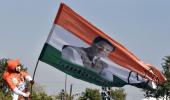Congress leader Rahul Gandhi on Monday told a group of civil society representatives the party's upcoming Bharat jodo yatra is like a tapasya for him and that he is ready for the "long battle" to unite the country.

The Congress had announced last week it will launch on September 7 the Bharat jodo yatra -- being billed by the party as the longest yatra mounted in this country over the last century.
Interacting with civil society members at the Bharat jodo yatra Conclave at the Constitution Club in New Delhi, Gandhi said the yatra is like tapasya for him, according to sources.
"I know uniting India (Bharat jodo) is going to be a long battle and I am ready for it," Gandhi was quoted as saying.
Stressing that the politics of the country has become "polarised", Gandhi said the idea of undertaking the yatra is to tell that on one side there is the ideology of the Sangh and on the other side is the ideology of uniting everyone.
"We are starting this journey with the belief that the people of India want the politics of uniting, not dividing," he was quoted as saying during the interaction.
The Bharat jodo yatra Conclave was attended by over 150 civil society organisations, movements, professionals and Unions with the likes of Aruna Roy, Syeda Hameed, Sharad Behar, PV Rajgopal, Bezwada Wilson, Devanoora Mahadeva, GN Devy and Yogendra Yadav, participating in it.
The conclave engaged in substantive discussions and expressed broad solidarity with the Bharat Jodo Yatra, a statement issued by the civil society representatives said.
The participant organisations welcomed the decision of launching the yatra and expressed their willingness to engage with the initiative. It was also decided that an appeal will be issued in the coming days for larger engagement of various civil society groups, jan andolans and individuals, the statement said.
In the morning, Congress leader Digvijaya Singh presented the details of the Bharat jodo yatra to the civil society delegates and invited those speaking up on people's issues to participate in it.
Gandhi met the civil society members in the afternoon.
Speaking with reporters after the meeting, Congress general secretary Jairam Ramesh, who was present in both sessions, said Rahul Gandhi spent almost 90 minutes interacting with about 150 civil society organisations drawn from 21-22 states of the country.
He said that during interaction, held in a question-answer format, Gandhi answered several posers from the civil society representatives.
"He (Gandhi) answered questions from 35-40 people. He had no notes or pad in his hands, and definitely no tele-prompter," Ramesh said in an apparent swipe at Prime Minister Narendra Modi who he often claims reads from the tele-prompter.
Ramesh said Gandhi talked about how the yatra is planned and what he expects from that.
"Mr Gandhi identified three main pillars of the Bharat jodo yatra -- economic, social and the political," he said.
Ramesh said there were very grave economic challenges confronting the country on account of inflation, unemployment and concentration of economic wealth and growing regional disparities.
He also pointed to social polarisation on the basis of caste, religion, dress, food and language.
Ramesh said there were political challenges on account of growing use of the Centre's institutions and complete weakening of the states.
Gandhi identified these three pillars as the fundamental pillars of the Bharat jodo yatra, Ramesh said.
"The yatra is by the Congress, its leaders are participating in it. It is a political yatra in a non-partisan way. We have appealed to other political parties, civil society groups and individuals who are worried, concerned, anguished and pained at the current state of the Indian democracy, society and economy to participate in the yatra," he said.
"We will launch logo, tagline and website of this 3,500-km long yatra which will be the longest yatra mounted in this country over the last century or so," he added.
Gandhi will participate in the yatra staring September 7 from Kanyakumari, Ramesh said.
The padayatra (foot march) will cover 12 states and two Union territories. It will be about 3,500-km long and will be completed in about 150 days, Ramesh told reporters last week.










